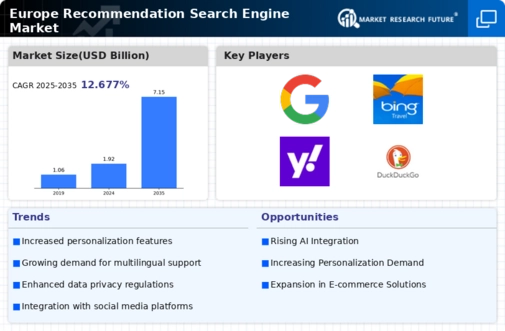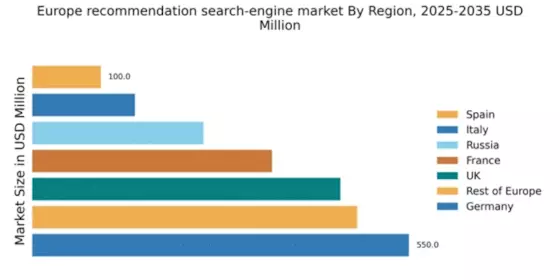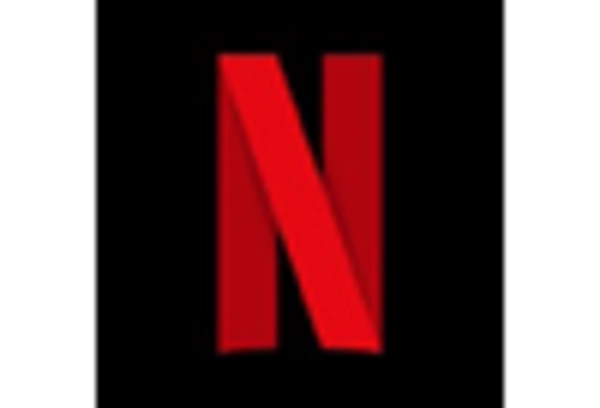Germany : Strong Demand and Innovation Hub
Germany holds a dominant market share of 29.1% in the European recommendation search-engine market, valued at $550.0 million. Key growth drivers include a robust digital infrastructure, high internet penetration, and a strong emphasis on data privacy regulations. The demand for personalized content is surging, driven by consumer preferences for tailored experiences. Government initiatives promoting digital transformation further bolster this growth, alongside significant investments in AI and machine learning technologies.
UK : Innovation and Consumer-Centric Focus
The UK accounts for 25.5% of the European market, valued at $450.0 million. Growth is fueled by a tech-savvy population and increasing demand for personalized recommendations across sectors like e-commerce and streaming. Regulatory frameworks, including GDPR, shape data usage, while government support for tech startups enhances innovation. The competitive landscape is vibrant, with London as a key hub for major players like Google and Amazon, driving local market dynamics.
France : Cultural Richness Drives Demand
France holds a 20.0% market share, valued at $350.0 million. The growth is driven by a strong cultural emphasis on media consumption and digital services. Increasing smartphone penetration and a young demographic are key demand trends. Regulatory policies promoting digital innovation and consumer protection are in place, while investments in tech infrastructure are on the rise. The competitive landscape features major players like Netflix and Spotify, particularly in urban centers like Paris.
Russia : Diverse Consumer Preferences Shape Trends
Russia represents 14.5% of the market, valued at $250.0 million. Key growth drivers include a large, diverse population and increasing internet accessibility. However, regulatory challenges and geopolitical factors impact market dynamics. The demand for localized content is rising, with significant interest in streaming services. Major players like Yandex and VKontakte dominate, particularly in cities like Moscow and St. Petersburg, where tech adoption is accelerating.
Italy : Cultural Heritage Influences Consumption
Italy accounts for 8.5% of the market, valued at $150.0 million. Growth is driven by a rich cultural heritage that influences media consumption patterns. The demand for personalized recommendations in fashion and entertainment sectors is notable. Regulatory frameworks are evolving to support digital innovation, while investments in broadband infrastructure are increasing. Major players like Amazon and Netflix are expanding their presence, particularly in cities like Milan and Rome.
Spain : Youthful Demographics Drive Growth
Spain holds a 5.5% market share, valued at $100.0 million. The growth is fueled by a young, tech-savvy population and increasing smartphone usage. Demand for personalized content is rising, particularly in entertainment and e-commerce sectors. Government initiatives to enhance digital literacy and infrastructure are in place. The competitive landscape features players like Google and Facebook, with key markets in Barcelona and Madrid driving local dynamics.
Rest of Europe : Regional Variations in Demand Trends
The Rest of Europe accounts for 27.0% of the market, valued at $474.4 million. This sub-region encompasses a variety of markets with distinct characteristics. Growth drivers include increasing internet penetration and a shift towards digital services across various sectors. Regulatory environments vary, impacting market entry and competition. Major players like Apple and Microsoft have a significant presence, with local dynamics influenced by cultural and economic factors in countries like Sweden and the Netherlands.


















Leave a Comment